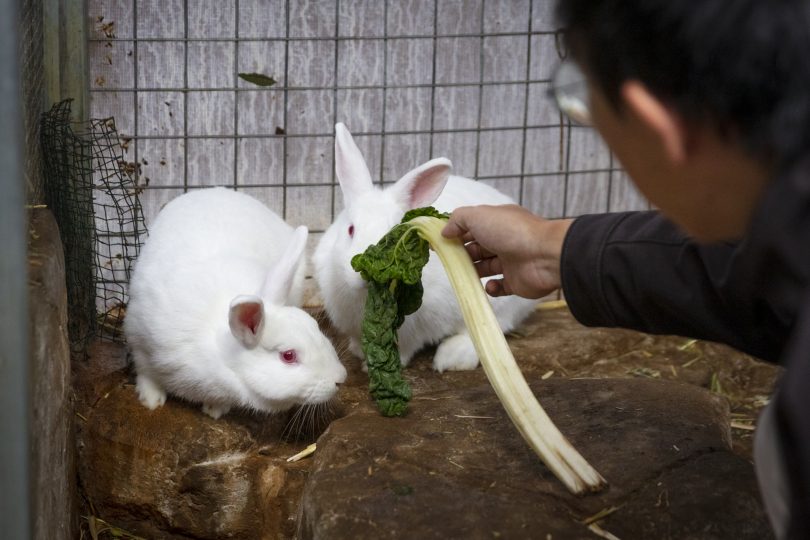
The filavac vaccine has been approved for use on pet rabbits more than 10-weeks-old. Photo: Thomas Lucraft.
RSPCA ACT has asked rabbit owners to vaccinate their pets after three bunnies in care died from a new variant of calicivirus.
All of the rabbits were vaccinated with the cylap RCD vaccine which was effective against the original strain of the virus.
Even owners whose rabbits have received the original vaccine have been urged to consider the new filavac vaccine.
“Vaccination is not just for cats and dogs,” RSPCA ACT CEO Michelle Robertson said.
“Go and have a conversation with your veterinarian and please make sure you’re educated on the options available.
“By getting your rabbit vaccinated against both strains of calicivirus, you could very likely save its life.”
Ms Robertson said RSPCA ACT could be a “last resort” for people who could not afford the vaccine.
Mondiaux Solar recently donated money to RSPCA ACT to assist with the vaccination of animals in care.
“Mondiaux has been working with RSPCA for more than two years now,” General manager Howard Lian said.
“We are glad our partnership with RSPCA has aided the vaccination of animals against deadly diseases and saved many lives.”
The new calicivirus vaccine starts to offer protection within seven days and only requires a yearly booster.
However Ms Robertson said people could also take immediate steps to protect their pets.
“We suspect that these [deceased] rabbits got infected via mosquitoes,” she said.
“Keep your rabbits safe in their accommodation by mosquito proofing the enclosure.”
Calicivirus can also be transmitted by flies, fleas, other rabbits or indirectly through contaminated environments.
Regular disinfection with a 10 per cent bleach solution and quarantining new rabbits for seven to 14 days reduces risk.
The virus has an incubation period of one to three days and a high mortality rate in unvaccinated rabbits.
Early symptoms include lethargy and loss of appetite. The disease then progresses quickly by damaging the rabbit’s organs, particularly the liver.
Australian Veterinary Association president Dr Bronwyn Orr said her association lobbied the Federal Government for the new vaccine to receive emergency approval for use in Australia.
“[The Australian Pesticides and Veterinary Medicines Authority] have discretion to make emergency use [of a vaccine] in instances where it’s essentially life threatening for the animal,” she said.
“In this case it was, so we’d been lobbying for over a year on this, and we’re really quite happy that it’s gone through.
“Because up until now … it was just a game of sitting ducks.”
But Dr Orr said the origins of the most recent strain of calicivirus were unclear.
“There’s three strains present in Australia … and the third and most recent one just kind of appeared,” she said.
“We don’t know how it came in but it was circulating in Europe beforehand.”
Calicivirus was first introduced to Australia in 1996 to control the wild rabbit population after the falling effectiveness of the 1950s-era myxoma virus.
But domesticated rabbits have not developed resistance to the myxoma virus, also called myxomatosis, and mortality rates remain high.
Telltale signs of the virus include swelling and discharge around the eyes, ears, lips, nostrils, anus or genital areas.
No vaccine is available in Australia due to concerns it could lead to wild rabbits further increasing their immunity to the virus.
“Vaccines available overseas are modified live-virus vaccinations (meaning they contain weakened forms of the virus),” said a Department of Agriculture, Fisheries and Forestry spokesperson.
“The weakened viruses in the vaccine could spread from domestic rabbits to the pest rabbit population.
“The vaccine for calicivirus … cannot be spread from vaccinated animals to target animals.”
But myxomatosis is transmitted similarly to calicivirus and the same methods of mosquito proofing, bleach cleaning and quarantining, all reduce risk.
Ms Robertson said RSPCA ACT was not aware of any local cases of myxomatosis and the newest strain of calicivirus remained the biggest threat to pet rabbits.
Original Article published by Travis Radford on Riotact.






